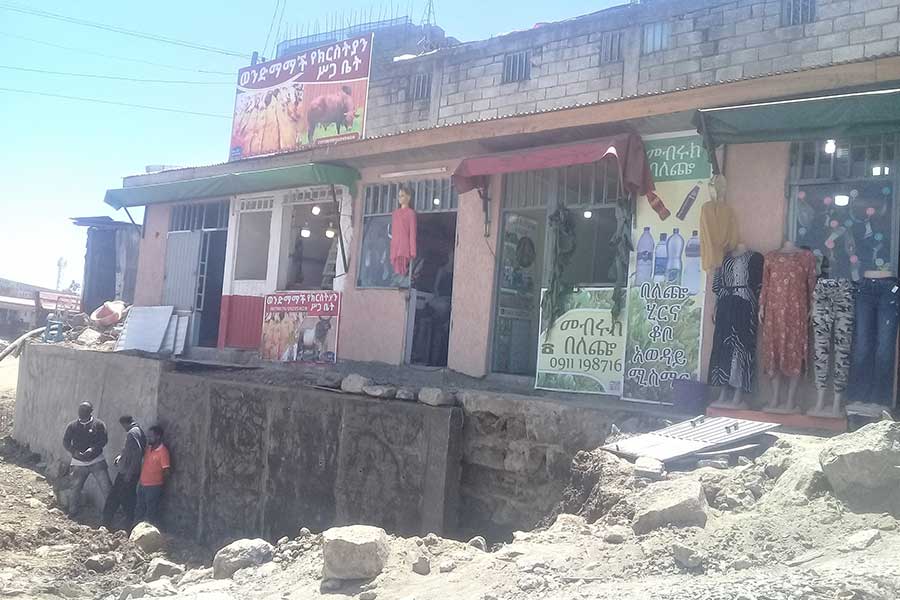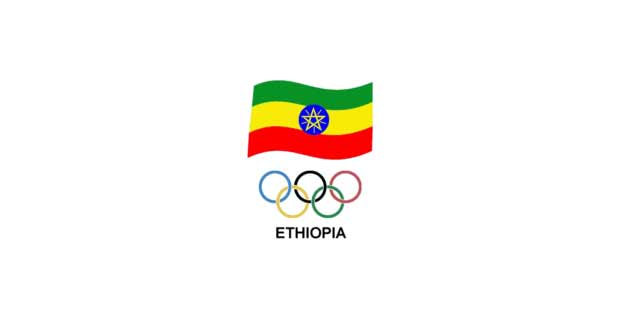
After his fourth appeal for a reevaluation of his tax audit was met with indifference, the 38-year-old Abiy Aman angrily stormed out of the Kirkos District Small Taxpayers Branch Office around the Qera area.
He had been operating a struggling funeral service business in the same neighbourhood for the past five years. When business slowed to a trickle, he decided to close it down and open a barbershop instead. But before he could do that, he was hit with a 52,000 Br fine due to discrepancies in his books.
"I threw the binder across the office," Abiy told Fortune. "It all happened in the heat of the moment."
Despite receiving clearances for renewals each year, Abiy was baffled by the demand for penalties.
The woes extended to his personal life, as he was compelled to send his daughter to live with his ex-wife after having trouble covering basic expenses around the house. He decided to arrange an instalment payment modality, to settle every two months and a half by borrowing from acquaintances.
"I'm feeling overwhelmed," he said.
It is customary to hear of business owners in Ethiopia frustrated with the bureaucratic hurdles concerning tax payments, obtaining or closing licenses, construction permits, customs clearance and inaccessibility of credit.
Far from astounding is that business owners such as Abiy would be faced with challenges with Ethiopia having a rank of 178 in minority investor protection. However, the situation is symptomatic of a deeper malaise as giant companies such as Unilever, with annual turnovers north of 60 billion euros worldwide, also face serious problems.
The Country Communication Affairs Director Degsew Amanu explained that his company's regulated corporate structure consistently clashes with unscrupulous actors embedded within the bureaucratic environment.
"Taxes, customs and forex are significant hurdles," he said.
Degsew disclosed that after global procurement procedures that meet international standards across 190 countries, clearance at the customs commission includes delayed clearances and dealing with under-invoice allegations from officers.
Unilever produces around eight brands in Ethiopia, commanding over 50pc of the detergent market with products such as Sunlight and Omo.
The company have had a growing popularity among consumers over the past few years, showcasing Signal toothpaste and Lifebuoy soap, which are locally produced. It opened its first on-ground operations in 2015 at Eastern Industrial Park in Dukem town, 35km southeast of Addis Abeba, with 7,000 employees.
Degsew went on to emphasise that issues are exacerbated by the difficulty of finding an ear from government officials to clarify the vast array of products and services it provides.
"We are a global brand offering a multitude of products," Degsew said, "not a business worth a few millions."
He also indicated that security issues had created hurdles in transporting inputs and products to local markets, all the while conceding that "conflicts are clearly bad for business".
The sentiment is fortified by the last World Bank index, which ranked the country 159th from 190 countries on ease of doing business by looking at 10 indicators.
International companies and non-profit organisations continue to use the parameters of the index to evaluate countries, despite the annual report being suspended in 2022 following allegations of data manipulation.
With the goal of getting the country's ranking below 100, a series of initiatives were launched by Prime Minster Abiy Ahmed (PhD) four years ago.
The Ethiopian Customs Commission, often cited as a source of frustration by importers for extended inspections and a lethargic clearance process, was among the institutions winded to improve its efficiency.
Head of the Risk Management Directorate Desk at the Commission, Gebreyesus GebreHiwot, indicated that an adjustment of priorities to balance regulation with business promotion was necessary.
He reflected on the Commission's contributions to the poor index ranking by recalling that 60pc of imports were tagged red, which entails conducting excessive physical inspections of merchandise.
"Too many shipments were considered high risk," he told Fortune.
Gebreyesus points to the reduction in the percentage of red-tagged imports to a fourth of the amount. He believes that control needs to be balanced with incentivising investment indicating the shift in priorities.
The director said the establishment of an intelligence team, a post-clearance audit system in which officers go to warehouses after they leave the Commission's compound and customer compliance schemes have filled in for manual inspections.
Gebreyesus indicated that all coffee exports and 75pc of sesame and oilseed exports have a green tag, which means permission for immediate clearance, as recent developments within the ease of business initiative.
He also indicated that prices and risk evaluations for any novel products by overseas companies are taken from trade unions and sectoral associations in the country. Gebreyesus acknowledged the importance of strengthening capacity building to enable the wider use of technology.
An electronic form to be filled by the applicant and a new operational manual which integrates different departments developed 12 years ago by an Indian company for 203,000 dollars and upgraded last year, are used by the Commission. But, high-ranking officials such as Commissioner Debele Kebeta acknowledged last week that unethical behaviour from the employees has a reverberating impact nationwide.
A practice deemed instrumental to curbing such practices and boosting the ease of doing business is electronic alternatives for manual procedures. Its adoption, however, has been gradual and unevenly distributed between cities and regional states.
Enabling the issuance of licenses through a digital system is espoused as an ongoing effort by the Addis Abeba Trade Bureau.
"We are digitising on all frontiers," said Sewnet Ayele, communication director.
He pointed to the two-year-old E-Trade system, an online platform that provides 16 business license services, as an indicator of the progressive approach. Of the 98,246 business license-related services given by the Bureau in the current fiscal year, about a tenth are new issuances while over 57,000 are renewals.
Sewnet acknowledged that Addis Abeba performs better on the digital front than other charter cities and regional states despite having a long way to go in integration between the public and government bureaus.
He underscores the importance of partnering with other public offices to alleviate the frustration citizens looking for service have to go through. He said their hotline number is constantly busy with urbanites from different parts of the capital forwarding complaints and indicating gaps in customer service.
The trade bureau works with tax authorities in order to enable the renewal, issuance and cancellation of business licenses.
The Addis Abeba Revenues Bureau, which has managed to collect 15 billion Br in the first month of the current fiscal year, is working towards raising the amount past the 140 billion mark for the year.
The E-tax system, which has been slowly gaining traction over the past three years is still restricted to "C" or low-income taxpayers who earn less than a million Birr.
"There is a lot more work to be done," said Wondemagegnehu Kassye, tax assessment director at the Bureau.
He said the bureau has a system for tax appeals that takes into account several measures as part of its initiative to enable ease of doing business. All taxpayers are expected to submit their documents for an audit at least once in a five-year period.
Taxpayers receive the amount they need to pay through SMS, while the exact office to which the payment is to be made is disclosed through the bureau's digital platform.
According to Wendemagegnehu processing taxpayers' documents digitally will decrease the amount of time spent which in turn creates easier and more reliable collection.
"We need to expand on electronic filing," he told Fortune, pointing to ongoing efforts to include middle-income taxpayers, who are expected to finish payment before September, in the E-tax system.
Officials at the federal level also indicated the same sentiment, aspiring for an expanded electronic process to address the needs of the business community in terms of license issuances and renewals.
Jirata Nemera, head of licensing the Ministry of Trade & Regional Integration, revealed plans to provide up to 90pc services in the coming budget year through an electronic medium, with the remaining 10pc left for providing accommodations to conflict-damaged areas.
"Transparency and good governance are bolstered through electronic means," he told Fortune.
The Ministry had given 1.5 million license-related services in the previous year, with less than a quarter being new issuances.
Jirata acknowledged the role of minimising contact between individuals but noted that a host of other factors come into play to improve the overall business environment.
One such factor is the issue of permits and registration within the construction industry.
A labyrinthine bureaucratic environment plagued by a chain of personnel distributed along several authorities and agencies with protracted sets of requirements has been a criticism of the Ethiopian construction industry.
Lengthy and complicated mazes to obtain a construction permit contribute significantly to the hindering ease of doing business in a country, according to reports by the World Bank.
Medina Ahmed, legal director of construction & infrastructure at the Ministry of Urban & Infrastructure, said greater reliance on technology will be required to simplify the hurdles faced within the construction industry. She revealed that a construction industrial policy will soon be open to public consultation that will likely help simplify and integrate regulatory supervision.
"Several software are currently in development," she told Fortune of ongoing efforts by the Ministry.
Medina suggested that the protracted periods with permits within the construction industry do not arise from the existence of too many regulations but rather gaps within implementation.
"Adaptability to technology is more apparent in the capital," she told Fortune of the uneven acclimatisation observed to developing technologies across the country.
Over 20,000 construction permits were issued in the capital during the past fiscal year with the length of time taken for the issuance of permits usually taking months, depending on the nature and complexity of the project. The initiative sought to bring down the required time to less than 30 days.
While the ease of doing business index is no longer available, World Governance indicators had negative scores looking at regulatory quality, government effectiveness, rule of law and the least being for political stability, which help highlight major factors.
Ethiopia had a clean score of 38 out of 100 in Transparency International's 2022 corruption index, placing it 94th of 180 countries.
The Federal Ethics and Anti-Corruption Commission (EFACC), reestablished under Proclamation 1236 two years ago, is endowed with expansive powers to investigate, prosecute and prevent all forms of corruption across the country.
Tesfaye Shemebo, chief executive director of the Commission, indicates that while technology helps in increasing transparency and hastens the provision of services, it still does not completely remove corruption.
He believes that technology has changed the manner of corruption from bribes being received door to door. However, he emphasises there is a lot more work necessary to realise a healthy public administration service by sealing digital loopholes.
Tesfaye pointed out that E-Government tools make it easier to provide services to a wider public. However, ridding them of corrupt practices will require investment in awareness creation, capacity and a more adept civil service at using technology.
"Digital does not necessarily mean corruption-free," Tesfaye told Fortune.
The Commission has launched a mobile application and website dubbed 'public feedback system' that allows anonymous tips on corrupt officials, which receives around 50 tips each month.
"Getting rid of corruption requires continuous vigilance", he told Fortune, pointing to responsibilities in officials and the general public.
Credit constraint is a major setback faced by emerging and ongoing businesses in Ethiopia with only 45pc of the population having access to bank accounts and less than 30pc of adults saving with formal institutions.
Financial institutions usually follow the six Cs: character, capacity, capital, collateral, conditions and credit score of borrowers to determine creditworthiness.
Bereket Teketel, credit portfolio director at Berhan Bank with over 33 billion Br in assets, attributes the concentration of credit in a few hands as arising from the combination of several factors including the prevailing macroeconomic conditions.
He referred to a tendency to refrain from compiling detailed financial information while indicating private banks' preference for foreign currency-generating businesses while value-adding businesses are being left out.
"Most businesses are quasi-formal," he told Fortune.
He went further to underscore that while businesses can improve their creditworthiness by proper registration of their finances, the industry is far from able to provide expanded access to credit noting the liquidity crunch gripping the industry.
"Private banks are having difficulties sending money in between themselves," he stressed.
The Minister of Planning & Development, Fistum Assefa (PhD), posted on social media last week that Ethiopia's Foreign Direct Investment inflows of 3.2 billion Br were due to reforms in ease of doing business while she declined to comment on the development of this content.
Business consultants who experience the brunt of the uneasy environment say the long list of issues requires a comprehensive overhaul of attitudes and policies towards almost every avenue of the business environment.
Getnet Haile, general manager of Target Business Consultants, points to the tediousness of having to rent an office to obtain a business license and the necessity of having to go through an audit just to change fields.
While the consultant encourages the shift towards E-governance in public procurements, he finds the heavy involvement of the government in the business landscape as an impediment to private business growth. He recommends outsourcing services to decrease the hassles of citizens at the different government bureaus.
"The government competes with the private sector on two fronts," he said, pinning the shortage of both foreign currency and credit as resulting from too much government involvement.
The veteran consultant said the tax authorities already presume that business people are evading taxes. He pointed to countries like South Sudan and Kenya, where tax appeals are automatically decided in favour of the citizen if the tax authorities do not dispose of their duties in a few days.
"Inconvenient taxes push people into informal sectors," he cautioned.
Policy shifts towards predictability, promotion of microfinance, reshuffling of priorities by creditors from exports to local business and extensive digitisation of customs procedures are endorsed by Getnet.
"It's not easy doing business in this country," he told Fortune in a succinct expression.
PUBLISHED ON
Oct 07,2023 [ VOL
24 , NO
1223]

Life Matters | Apr 02,2022

Viewpoints | Jan 13,2024

Verbatim | Nov 02,2024

Sponsored Contents | Mar 28,2022

Radar | Jul 03,2021

Radar | Mar 07,2020

Radar | Nov 21,2020

Commentaries | Apr 17,2021

Featured | Jan 07,2024

Fortune News | Sep 08,2019

Dec 22 , 2024 . By TIZITA SHEWAFERAW
Charged with transforming colossal state-owned enterprises into modern and competitiv...

Aug 18 , 2024 . By AKSAH ITALO
Although predictable Yonas Zerihun's job in the ride-hailing service is not immune to...

Jul 28 , 2024 . By TIZITA SHEWAFERAW
Unhabitual, perhaps too many, Samuel Gebreyohannes, 38, used to occasionally enjoy a couple of beers at breakfast. However, he recently swit...

Jul 13 , 2024 . By AKSAH ITALO
Investors who rely on tractors, trucks, and field vehicles for commuting, transporting commodities, and f...

Jun 28 , 2025
Meseret Damtie, the assertive auditor general, has never been shy about naming names...

Jun 21 , 2025
A well-worn adage says, “Budget is not destiny, but it is direction.” Examining t...

Jun 14 , 2025
Yet again, the Horn of Africa is bracing for trouble. A region already frayed by wars...

Jun 7 , 2025
Few promises shine brighter in Addis Abeba than the pledge of a roof for every family...